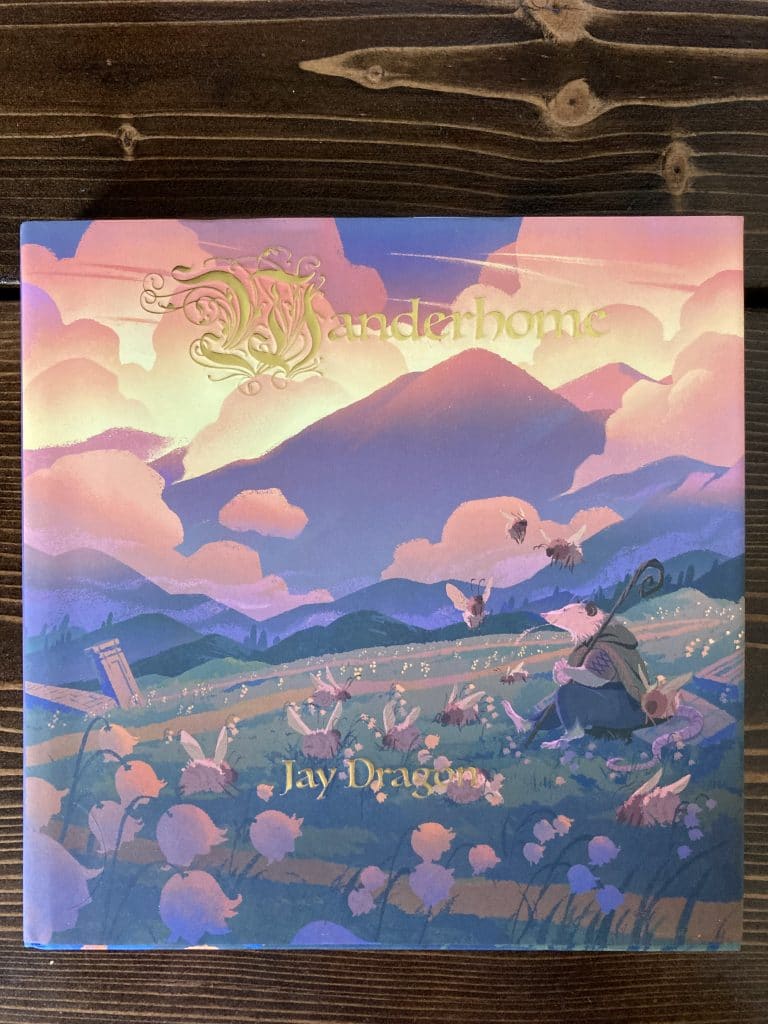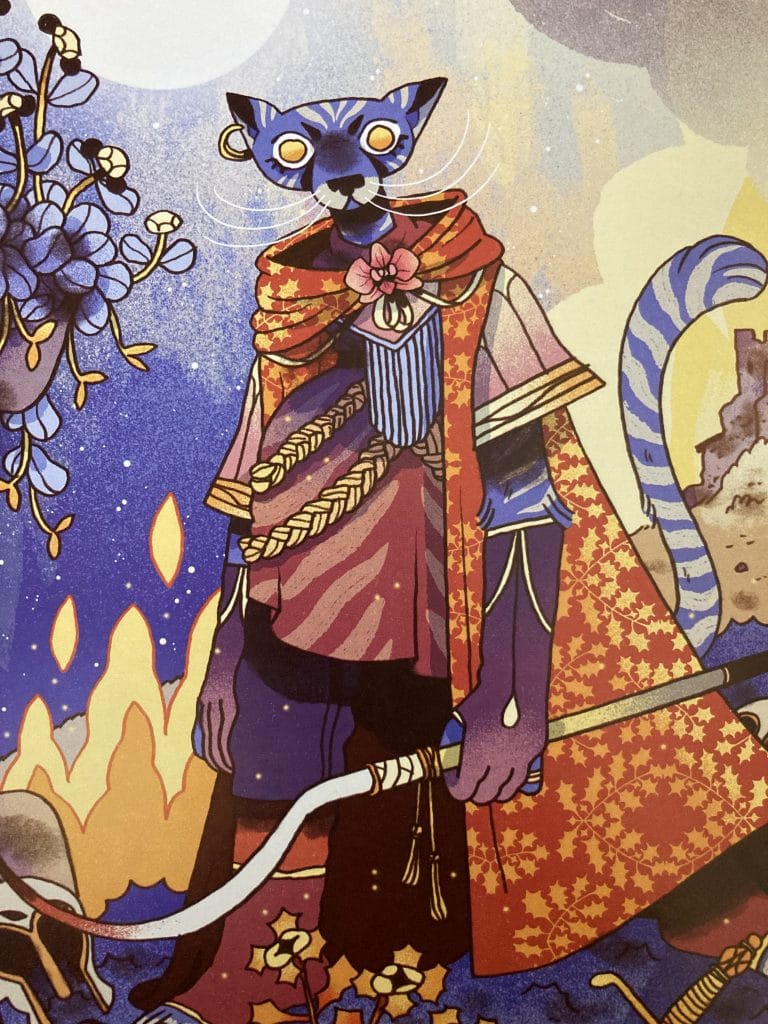When we talk about tabletop roleplaying games, everybody’s minds immediately venture to games filled with sprawling underground labyrinths and fearsome, fire-breathing beasts. However, there are countless other tabletop games that offer so much more than just gearing up and slaying monsters. Wanderhome is one such game.
I’m going to preface this by saying that Wanderhome is unlike any other tabletop game that I’ve played before. It’s unique in the sense that, where other games promise an open world, Wanderhome actually feels like one.
Wanderhome is described as a ‘pastoral fantasy role-playing game’ and that’s such a great way to put it. Imagine if if the best, non-combative parts of Redwall were put on full display and you could insert yourself into that world. On the website for Wanderhome, designer Avery Alder shares a wonderful quote that perfectly encompasses my feelings about Redwall in comparison to Wanderhome:
“I grew up reading books about Redwall. The opening pages were full of lavish descriptions of the communal feasts that mice were scurrying about preparing, and the playful merriment that all the rabbits and other woodland creatures were getting up to. I loved those opening pages. But they always gave way to long chapters about war, pillaging, and slaughter. The meadow was monotonously besieged by evil, violent forces. Wanderhome asks a question I wish more games would ask: what if the meadow gets to stay safe and happy this time? What if those opening pages get to last forever?”
Avery Alder, designer of Monsterhearts
My childhood dreams were beset with candied chestnuts and rucksacks filled with Deeper’n’Ever Turnip’n’Tater’n’Beetroot Pie. If I could just sit down to one of those feasts and partake in the camaraderie of the woodland creatures, that’s all that I would ever need.
And Wanderhome gives us that chance.
Wanderhome: Explore the World and Yourself
Wanderhome is going to be different than other tabletop roleplaying games that you’ve played in the past. You won’t be rolling any dice, and there isn’t an all-knowing Gamemaster running the show.
Instead, sessions of Wanderhome can even be played solo, or by using a rotating cast of guides who help give voices to the places and kith present in the world, known as Hæth. As you play, you’ll be picking up these kith and moving the narrative forward in any way you see fit. In that sense, Wanderhome truly represent collaborative storytelling, because the entire table is invested in the world around them.
Wanderhome also gives some of the best examples of play that I’ve seen in a roleplaying game. Throughout the first 43 pages, the author, Jay Dragon, presents wonderful samples that showcase how evocative, dramatic, and free your game can be. My favorite dialogue comes on page 29, where the players are giving voice to the world. Different Natures are used literally and metaphorically, showing how the making simple choices can bring conflict and breathe life into the world.
What I appreciate most is that Wanderhome reads like the author is sharing an intimate conversation with you. Reading the book by itself is an experience that made me more introspective and appreciative of the world around me. You’re meant to connect with your emotions and see things through new perspectives. Who knew that taking a moment to bask in the morning dew could be so grounding?
Wanderhome: Asking the Right Questions
The majority of Wanderhome details various sections that can help jumpstart and springboard imaginations into a pastoral headspace. It’s interesting because these sections define aspects of the game, but at the same time leave it very open-ended to various interpretations. You’ll find sections detailing the following:
- Playbooks: Each player can use a Playbook which helps determine the defining features of their character. There are 15 different Playbooks to choose from, ranging from the attentive Caretaker to the retired Veteran. And, if there’s another idea that isn’t included, you’re more than welcome to come up with Playbooks of your own, using the existing ones as templates and guides.
- Traits: As you play through the game, you’ll meet tons of characters on personal journeys of their own. Traits provide a simple way to define those characters through attributes. If you’re looking for a range of creative adjectives, you’ll find great comfort in these.
- Natures: Oh the places you’ll go! And each of those places holds something special or mundane, and can invoke a multitude of feelings while within its domain. Natures are essentially the traits of those places. And keep in mind, a Carnival doesn’t have to be a literal carnival with tents and trapeze; it could be a palace feast or a traveling theater troupe.
- Seasons, Months, and Holidays: The world, and our story, revolves around the calendar. It’s important for us to recognize the changes to the world that occur naturally as we move from place to place. There are five seasons in the year, each comprised of two months and specific holidays. It’s amazing how the season allows us to approach the story in innovative new ways.
Wanderhome defines a lot, but leaves so much up to interpretation, and that’s what I love about the game. The reader is prompted with lists and questions, which aren’t meant to be exhaustive. Instead, they’re intended to be broad and get you to think deeper than the surface and discover meaning and perspective.
I also appreciate the folklore presented in each Nature. These are undefined topics that might be a part of a particular place, like The Cat With The Magic Ale, or The Impossible Rain. It’s left to us, the players, to determine what these things are. That’s incredibly fun. And while every table might have The Boat That Would Not Sink, it’s going to be completely original and unique to your own game.
As a player, those sorts of creative prompts are the sort of improvisation that brings me joy, like I’m finishing someone’s sentence and I can take it in any direction I please.
Wanderhome: Find Your Way Home
Wanderhome is a game about traveling and experiences. It’s about discovery and self-reflection as you encounter kith and kin who live differently than yourself. It’s about finding appreciation in the everyday, living in the moment, and bathing in the memories of your true home.
The pace of the game can be peaceful and slow, as you and your companions follow the winding roads of Hæth. It can be frantic and frenzied, as you get caught up in the excitement of the unknown. It can be sorrowful and charged, as you say goodbye to treasures you hold dear. At the end of the day, your table will shape your experience of Wanderhome.
There is no jumping from encounter to encounter, gaining experience, and accumulating loot. There isn’t a ‘big bad’ who is throwing challenges at you with every tick of the clock. There are only the kith and kin of the world, which manifest themselves exactly when we are ready to experience them.
Wanderhome is a journey that will put many tabletop players outside of their comfort zone, slowing them down to a more contemplative state. Its lessons are ones that are applicable to the real-world; there are stories everywhere. Some of them have been told in countless iterations, while others are awaiting a suitable bard to sing them for the world. It’s about finding goodness in the world around us, especially those things that we pass over every day.
I can’t sing enough praises about Wanderhome. It truly makes you think in new ways as you go on a journey with your table. And the art…it’s whimsical, beautiful, thoughtful, and fantastical all at once. Much appreciation goes out to Ruby Lavin who provided the art direction for the book.
You can find Wanderhome over at Possum Creek Games in PDF form, paperback, or hardcover. You can also check out all of their other amazing projects in the same place. You won’t be disappointed.



